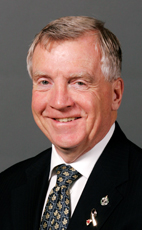Mr. Speaker, I always enjoy listening to the fantasies coming out of the mouth of the member for Kitchener Centre.
Allow me first, though, to say how pleased we are by the initial outcomes of the NATO summit in Bucharest. The commitments made by our allies are good news for Canada and good news for NATO.
More important, though, the additional troops are good news for the people of Afghanistan, who are working hard to rebuild their lives. We will certainly be discussing the specifics of the additional troop commitments with our allies in the coming months.
An enhanced NATO presence will allow the Canadian Forces to consolidate and expand stability and security operations in Kandahar, which will further allow our development and governance efforts to take root. The commitment of additional troops satisfies one of the important conditions set out in the motion adopted by the House to extend our contributions to the United Nations mandated NATO-led mission in Afghanistan.
Another important recommendation put forward by the independent panel on the future of Afghanistan was the requirement for high performance UAV and helicopter capabilities for our troops in Afghanistan. We are well on our way to achieving that goal. We certainly appreciate our allies' efforts to assist with our need for additional helicopters, including the recent announcement by Poland that it will deploy additional helicopters to Afghanistan.
The government continues to demonstrate its commitment to providing our troops with the equipment and protection they need to fulfill their tasks. To that end, we have significantly enhanced our capabilities in the field.
For example, our new route clearance vehicles are reducing the risk of convoy travel. We are also making arrangements to keep the Leopard 2 tanks in theatre until the end of the Canadian mission.
With respect to helicopters and UAVs, we have been working for some time now to procure capabilities for domestic and international operations, including Afghanistan. I can assure members of the House that the government is actively working on accelerating the acquisition process to provide our troops with the equipment they need.
For example, the Department of National Defence has already announced its intention to acquire Chinook helicopters for domestic and overseas operations. This project has been approved by cabinet and it is anticipated that a contract will be awarded this year.
To address our immediate needs, the government is currently exploring a number of options with our allies and industry.
For example, we are looking at the possibility of acquiring Chinooks that are already configured for U.S. army operations in Afghanistan. We are also exploring leasing options with industry and are looking at our existing fleets to determine what might be possible.
Leasing civilian helicopters is also common practice in Afghanistan. Private companies are already providing this service to the UN, the Afghan government and some of our NATO allies for operations in lower risk areas.
With respect to UAVs, we are currently working with our colleagues at Public Works and Government Services Canada on a number of options to provide our troops with high performance UAVs as soon as possible.
In fact, we have a three year project called Noctua, aimed at leasing high performance, long endurance UAVs capable of intelligence gathering throughout the Canadian Forces' area of operations in Afghanistan. This project will be a substantial improvement over what we currently have in theatre and is expected to be operational in theatre by February 2009.
A letter of interest to industry has already been posted on the Internet and it is anticipated that a request for proposal will be released very soon.
Our government is also working on the purchase of long-range UAV systems for domestic and international operations, including maritime and Arctic surveillance. We are working to deliver these capabilities as quickly as possible in order to meet the safety and security requirements of our troops and are confident that we can deliver these capabilities by February 2009.
These initiatives highlight our commitment to rebuilding the Canadian Forces and ensuring the safety of our men and women in Afghanistan.
After decades of darkness, some of which I lived through, I can tell members that the men and women of the Canadian Forces are not confused at all about what we are doing in Afghanistan. They are not confused at all about what the government is doing for them. We are going to continue to get the job done, with or without the help of the opposition.

